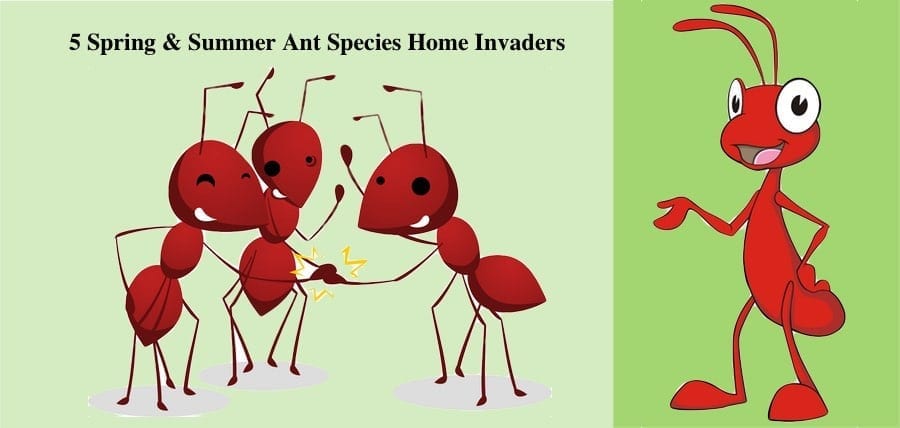5 Spring & Summer Ant Species Home Invaders
Ants. They look like tiny aliens wearing armor, sometimes marching in a line or building a mound for us to step in. Let’s take a look at the different kinds of ants and their roles in the insect kingdom.
Pavement Ants
It’s believed pavement ants were initially introduced by merchant vessels coming from Europe in the 18th and 19th centuries. Humans generally tolerate pavement ants. That is until they climb into the coleslaw during your picnic. Their name is earned from their propensity for burrowing underneath sidewalks, concrete slabs, and underneath your picnic blanket.
Pavement ants seem to have super-insect strength. They can sometimes be seen hauling eggs, soil, food or debris between colonies. Don’t let them invade your patio! Pest control experts will use baits and dust to eliminate the colonies.
Carpenter Ants
As we move up the chain in the ant world, the carpenter ant comes next. These pesky critters are larger than common pavement ants and have an ulterior motive: to burrow into the wood in your home and make a nest. They actually chew holes in the wood with their powerful mandibles. This makes them a valuable part of the Earth’s ecology, though, and have a place in helping decompose wood in forests. However, they have no place in your home!
Carpenter ants can cause major damage to wooden structures. A knowledgeable pest control company can save your house or other buildings with the proper treatments, which may include drilling temporary holes in walls to locate nests, so chemicals can be applied directly.
Pharaoh Ants
Pest professionals consider pharaoh ants to be one of the hardest species to control. They are bad news, particularly in hospitals, because they carry disease and easily contaminate rooms and equipment that have been sterilized. That is why they are a dreaded sight in hospitals.
The pharaoh ant is really small, measuring only 1/16 of an inch in length. They are lighter in color than other ants, ranging from yellow to bright red. You will know them when you see them because of the black markings they have on their abdomens, indicative of a troublemaker in the natural world. Populations can grow out of control so never ignore them. They are known to carry dysentery and salmonellosis. Also, do not try to get rid of pharaoh ants yourself. Using the wrong pesticide may cause budding, a process where a few ants break away from the group and form another colony, making the infestation worse
Little Black Ants
These are the ants that love your sugar bowl! You might see them marching like soldiers in a line across your counter. They even fly, and, in the summer, the male ants fly and mate in the air before dying. The queen will then make a new nest, lay eggs, and shed her wings.
Little black ants are hard to get rid of and may return again and again. Your best shot at getting rid of them is by using a pest control company that knows how to find them and bait them.
Odorous Ants
This ant smells like rotten food if it is crushed, and that is how it got its name: odorous ant. Worse, these ants tend to contaminate open containers of food. They do bite, but their bite is not very painful.
If an infestation is treated improperly with aerosols or liquids, odorous ants will scatter and create more nests. They can be very persistent and hard to get rid of but are a very common household ant. Make sure these smelly ants don’t get into your pancake mix. Pest control companies are very experienced with these invaders and will help you get rid of them once and for all.
Do you have an ant problem or need protection before any of these 5 ant species start settling in your residential or commercial space? No need to worry, NJ Pest can help you now. Contact us to learn more.

